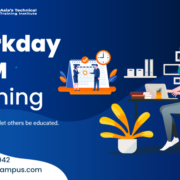What Goes On Behind the Scenes When You Press Offer in Workday?
Introduction:
In Workday HCM, one click can open a string of extremely automated procedures. As one who has some knowledge of Workday HCM or who is pursuing a Workday HCM Certification, you may already be familiar with the ‘Offer’ button. But what goes on behind the scenes when you press it?
We’re no longer in a universe where HR systems only juggle data. Workday, in 2025, brings everything together: from hiring talent to payroll, so that your offer process is seamless, compliant, and accurate. So let’s dissect it in a way that will make sense if you already have the fundamentals mastered.
Automated Workflows: Under the Hood
When you make the ‘Offer’, it’s not about sending an email or producing a letter. Workday performs several layers of validation and checks, all because of its design.
Candidate Verification: Workday checks the candidate profile for accuracy and completeness. It retrieves information from different modules to ensure all the details are consistent with the job description and qualifications.
Compensation Alignment: The system verifies your compensation structure and policies so that the compensation is aligned with company policies. It’s all automated, no room for human error.
These aren’t simple steps—they’re forceful integrations working behind the scenes.
Approval Process: Workday’s Workflow Engine in Action
Once the compensation information has been verified, the offer enters a workflow approval phase. This is where Workday’s automation excels.
The process automatically sends the offer to the right individuals to approve. No more relying on HR to manually ride approvals.
Various locations, such as Bangalore, may invoke certain workflows that accommodate the local legal and compliance needs. For instance, in Bangalore, organizations need to factor in certain tax advantages, stock options, and compensation styles.
Before the “Offer” reaches the candidate’s mailbox, it has already passed multiple levels of scrutiny.
Seamless Payroll & Benefits Integration:
When the offer is accepted, Workday proceeds to the next phase: integration with Payroll and Benefits. The accepted offer data integrates seamlessly into these modules.
For Workday Payroll Certification professionals, this is a critical aspect. When an offer is accepted, payroll data flows directly into the system without manual intervention.
It’s not just payroll; benefits like healthcare, retirement plans, and stock options are also automatically initiated. Everything aligns in real time.
This level of automation makes the hiring process faster and error-free.
Data Security: Protection at Every Step
When you hit ‘Offer,’ Workday doesn’t merely process the information—it encrypts it. From compensation to personal information, everything is kept safe. As data protection laws continue to become more stringent across the world, security during the offer process is not negotiable.
For individuals who have a Workday Payroll Certification, this is even more applicable. The payroll module encrypts sensitive financial data, so that when the offer data is transmitted to the payroll system, it is still safeguarded.
Workday’s Offer Process Breakdown:
| Stage | Description | Key Workday Module |
| Candidate Profile Verification | Cross-checks candidate data against job requirements. | Recruiting, HCM |
| Compensation Plan Application | Aligns salary, bonuses, and commissions with company policies. | Compensation |
| Offer Approval Workflow | Routes the offer to the necessary decision-makers for approval. | Workflow Automation |
| Offer Letter Generation | Automatically generates an offer letter based on company templates. | Document Generation |
| Integration with Payroll/Benefits | Updates payroll and benefits systems with accepted offer data. | Payroll, Benefits, Integration |
How do Regional Scenarios Affect Workday’s Offer Process?
Let’s zero in on Bangalore. If you’re working with Workday in cities like Bangalore, you’ll notice that the system adapts the offer process based on local tax regulations and employment laws.
In Bangalore, there’s a special set of tax regulations surrounding stock options for tech professionals. Workday automatically adapts the offer structure accordingly.
Workday’s localized training offerings, including Workday Training in Bangalore, have become more popular as Bangalore companies grow. These courses deal with managing region-based tax legislation, which is state-to-state in India.
In a technology hub such as Bangalore, Workday not only streamlines the process but also tailors it to fit the local environment.
Local Customization in Workday:
Workday isn’t a one-size-fits-all solution. It changes according to regions and sectors, particularly when working with Bangalore. In a city with an accelerating tech scene, Workday customizes compensation and benefits packages according to local tax regulations and employee demands.
Whether stock options for technology talent or geographically based bonuses, Workday tailors the offer process so that it complies with and addresses local marketplace needs. With such flexibility, companies are better able to bring in talent without any hiccups.
Sum Up:
Learning what happens when you hit ‘Offer’ in Workday HCM is about learning more than the fundamentals. Workday integrates several built-in workflows to automate and simplify the hiring process. From candidate information verification to payroll and benefits integration, it all occurs behind the scenes. For career professionals looking to become an expert at this system, like those working towards Workday Payroll Certification, understanding the technicalities of these processes is essential.
With businesses expanding and growing by the day, particularly within the tech capitals of Bangalore, it is crucial to know how Workday is able to respond to local needs. Workday’s automation, security, and integration help ensure that HR teams are able to scale up, making the recruitment process easier, quicker, and more efficient.








Leave a Reply
Want to join the discussion?Feel free to contribute!